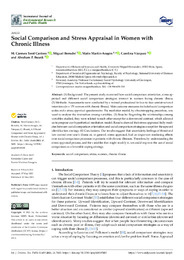Título :
Social Comparison and Stress Appraisal in Women with
Chronic Illness |
Autor :
Terol Cantero, M Carmen 
Bernabé, Miguel
MARTÍN-ARAGÓN, MAITE 
Vázquez Rodríguez, Carolina
Buunk, Abraham P. |
Editor :
MDPI |
Departamento:
Departamentos de la UMH::Ciencias del Comportamiento y salud |
Fecha de publicación:
2021-05 |
URI :
https://hdl.handle.net/11000/34975 |
Resumen :
Abstract: (1) Background: The present study examined how social comparison orientation, stress ap-
praisal and different social comparison strategies interact in women facing chronic illness.
(2) Methods: Assessments were conducted by a trained professional in face-to face semistructured
interviews (n = 179 women with chronic illness). Main outcome measures included social comparison
scales and a stress appraisal questionnaire. The mediation model, by a bootstrapping procedure, was
used to analyze the interaction among variables. (3) Results: Regarding the relationships among
variables studied, they were related to each other except for a downward contrast, which allowed
us to propose our hypothetical mediation model. Results showed that stress appraisal fully medi-
ates between social comparison orientation and social comparison strategies except for the upward
identification strategy. (4) Conclusions: Our results suggest that uncertainty, feelings of threat and
low control over one’s illness or, in general, stress appraisal, had an important mediating effects
over social comparison processes in patients with chronic illnesses. Therefore, by understanding the
stress appraisal process, and the variables that might modify it, we could improve the use of social
comparison as a favorable coping strategy.
|
Palabras clave/Materias:
social comparison
stress
women
chronic illness |
Área de conocimiento :
CDU: Ciencias aplicadas: Cuestiones generales de las ciencias aplicadas |
Tipo de documento :
info:eu-repo/semantics/article |
Derechos de acceso:
info:eu-repo/semantics/openAccess
Attribution-NonCommercial-NoDerivatives 4.0 Internacional |
DOI :
https://doi.org/10.3390/ ijerph18105483 |
Publicado en:
Environ. Res. Public Health 2021, 18, |
Aparece en las colecciones:
Artículos Ciencias del Comportamiento y Salud
|
 La licencia se describe como: Atribución-NonComercial-NoDerivada 4.0 Internacional.
La licencia se describe como: Atribución-NonComercial-NoDerivada 4.0 Internacional.
.png)
